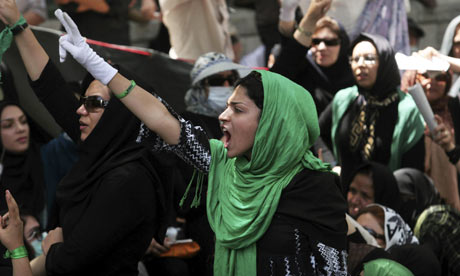Iran is ready to build an N-bomb - it is just waiting for the Ayatollah's order
August 3, 2009
James Hider, Richard Beeston in Tel Aviv and Michael Evans, Defence Editor
Iran has perfected the technology to create and detonate a nuclear warhead and is merely awaiting the word from its Supreme Leader, Ayatollah Ali Khamenei, to produce its first bomb, Western intelligence sources have told The Times of London.
The sources said that Iran completed a research programme to create weaponised uranium in the summer of 2003 and that it could feasibly make a bomb within a year of an order from its Supreme Leader.
A U.S. National Intelligence Estimate two years ago concluded that Iran had ended its nuclear arms research programme in 2003 because of the threat from the American invasion of Iraq. But intelligence sources have told The Times that Tehran had halted the research because it had achieved its aim — to find a way of detonating a warhead that could be launched on its long-range Shehab-3 missiles.
They said that,
should Ayatollah Khamenei approve the building of a nuclear device, it would take six months to enrich enough uranium and another six months to assemble the warhead. The Iranian Defence Ministry has been running a covert nuclear research department for years, employing hundreds of scientists, researchers and metallurgists in a multibillion-dollar programme to develop nuclear technology alongside the civilian nuclear program.
“The main thing (in 2003) was the lack of fissile material, so it was best to slow it down,” the sources said. “We think that the leader himself decided back then (to halt the program), after the good results.”
Iran’s scientists have been trying to master a method of detonating a bomb known as the “multipoint initiation system” — wrapping highly enriched uranium in high explosives and then detonating it. The sources said that the Iranian Defence Ministry had used a secret internal agency called Amad (“Supply” in Farsi), led by Mohsin Fakhri Zadeh, a physics professor and senior member of the Iranian Revolutionary Guards Council.
The system operates by creating a series of explosive grooves on a metal hemisphere covering the uranium, which links explosives-filled holes opening onto a layer of high explosives enveloping the uranium. By detonating the explosives at either pole at the same time, the method ensures simultaneous impact around the sphere to achieve critical density.
“If the Supreme Leader takes the decision (to build a bomb), we assess they have to enrich low-enriched uranium to highly-enriched uranium at the Natanz plant, which could take six months, depending on how many centrifuges are operating.
We don’t know if the decision was made yet,” said the intelligence sources, adding that Iran could have created smaller, secret facilities, other than those at the heavily guarded bunker at Natanz to develop materials for a first bomb. Inspectors from the International Atomic Energy Agency only keep tabs on fissile material produced at monitored sites and not the number of centrifuges that Iran has built.
Washington has given Iran until next month to open talks on resolving the nuclear crisis, although hopes of any constructive engagement have dimmed since the regime’s crackdown on pro-reformist protesters after June’s disputed presidential elections.
Ehud Barak, Israel’s Defence Minister, last week reiterated that a military strike against Iran’s nuclear facilities was still an option, should the talks fail. Israeli officials estimate that a raid on Natanz and a nuclear facility at Arak, in central Iran, would set Iran’s nuclear programme back by two to three years.
An Israeli official said that Iran had poured billions of dollars over three decades into a two-pronged “master plan” to build a nuclear bomb. He said that Iran had enriched 1,010kg of uranium to 3.9 per cent, which would be sufficient for 30kg of highly enriched uranium at 95 per cent. About 30kg is needed to build one bomb.
British intelligence services are familiar with the secret information about Iran’s experiments, sources at the Foreign and Commonwealth Office said. Although British agencies did not have their own “independent evidence” that Iran had successfully tested the explosive component of a nuclear warhead, they said there was no reason to doubt the assessment.
If Iran’s leader does decide to build a bomb, he will have two choices, intelligence sources said. One would be to take the high-risk approach of kicking out the international inspectors and making a sprint to complete Iran’s first bomb, as the country weathered international sanctions or possible air strikes in the ensuing crisis. The other would be to covertly develop the materials needed for an arsenal in secret desert facilities.
Last week, during a series of high-level US visits to Israel, officials outlined Washington’s plans to step up sanctions on Iran, should Tehran fail to agree on talks. Robert Gates, the Defence Secretary, and General James Jones, the National Security Adviser, said that Iran had until the end of next month, when the UN General Assembly is to meet, to make a positive move towards engagement.
If Tehran fails to respond, Washington aims to build a tough international coalition to impose harsh sanctions focusing on petroleum products — an area where Iran is particularly vulnerable because it sends almost all of its crude abroad for refinement.
Experts believe that the unrest of the summer will make Iran particularly vulnerable to sanctions. They would also hit the Revolutionary Guards Council, which finances its operations by running a huge conglomerate of international companies, rather than drawing directly from state coffers.















